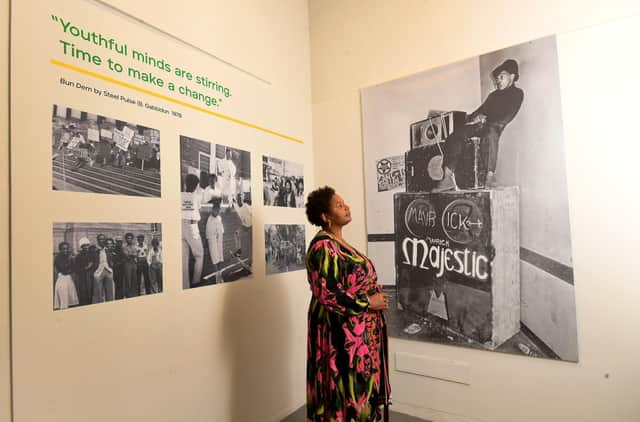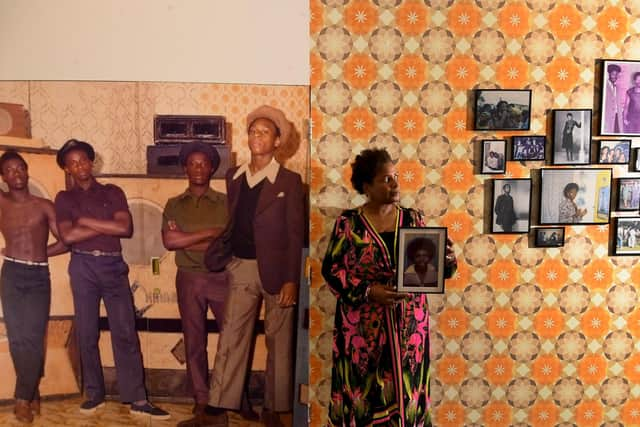Photographic exhibition celebrating 60 years of Leeds Jamaican community


Each image tells a story. Every characteristic is captured from a moment in time and now showcased for all to see amidst the marble, mosaic and tiled interior splendour of one of Leeds’ finest buildings. Rebellion to Romance is a major exhibition documenting the lives of Black Britons coming of age in the Seventies and Eighties and open to the public at the Grade II listed Leeds Central Library in Calverley Street until October 29.
Featuring the work of Vanley Burke, regarded as the Godfather of Black British photography, the exhibition explores the lives of the city’s second-generation West Indians who, while immersed in their parents’ Caribbean roots, are shaping their own identity. Organised by the Jamaica Society Leeds, whose chairman is the Rev Dorothy Stewart, the exhibition is part of the society’s Out of Many Festival which celebrates the impact the small Caribbean island has had on Leeds and the World. This year commemorates 60 years of Jamaican independence from Britain with Leeds holding the biggest Jamaica 60 celebration in the UK.
Advertisement
Hide AdAdvertisement
Hide AdFestival director and Rebellion to Romance exhibition Curator, Susan Pitter, explains they received hundreds of submissions following a call-out for photographs, memories and keepsakes.


“Rebellion to Romance follows on from the society’s 2019 Eulogy Project on first-generation Jamaicans in Leeds,” says Susan, for whom the exhibition holds a particular poignancy.
“It means a lot to me because it is about my generation, and my experience because I am the daughter of Jamaican parents who came here in the early 60s. I came of age, was a teenager and a young adult in the 70s and 80s so it’s my era. A few years back in 2019 when I did the project about the first generation that was a tribute to them – this is an ode to my generation.
“A lot of the times we are looking at the experiences and lives of the Black community – we call it Black British history – which it is, but it is British history, it is Leeds history – we are not separate or apart – we are part of British history and we need to recognise that and make it more visible, make sure it is heard and that it is seen as well.” Some of the contributors of the images were re-captured as they are now by Vanley in the city’s iconic Potternewton Park located in the heart of Chapeltown.
Advertisement
Hide AdAdvertisement
Hide Ad“The idea is to look at what shaped us and the influences and the cultures that influenced us. What these pictures do is show a moment in time that shaped us, that impacted and affected us. It explains who we are now,” says Susan.
The exhibition features 19 pairs of photographs some featuring those as they were then and as they are now. Basketball coach, Norman ‘Too Tall’ Francis is among the participants. Born and raised in Chapeltown, Norman recalls the difficulties they faced as teenagers around racism, and how Chapeltown became a sanctuary of support.
“We created our own culture that our parents brought over and it got mixed in with British culture which is a big part of the British culture right now,” says Norman.
“It was a really good community vibe, people helped each other, we created our own functions, our own fun.”
Advertisement
Hide AdAdvertisement
Hide AdNorman says being part of the exhibition is ‘an honour’ and he is also proud of the contribution to the city.
“We are proud to be part of it, to contribute and be part of the fabric. For me, personally, to be involved with that, and to be featured in the exhibition is an honour and my grandchildren will come and see that and be proud of me and their heritage.”
Says Susan: “Vanley’s portraits capture a generation that can firmly say ‘We are black, we are British, we are West Indian and we are Leeds.’”
Vanley came to England from Jamaica when he was 14. He became interested in photography when he was a child and decided to capture people’s pictures after being fascinated by the stories he heard from Jamaicans visting his parent’s shop in Birmingham.
Advertisement
Hide AdAdvertisement
Hide Ad“I think everyone’s stories need to be told, but what has happened in the past is that our stories were never told by us, it has always been narrated or curated by someone else,” says Vanley.
“While all of us have stories, not all of us are story tellers and I decided I would start by documenting our unique position in history. I felt that what I couldn’t take I would collect.
“I decided to dedicate my life photographing, preserving, archiving and making available the material for the use of every one of us about our experience here in England.”
Rebellion to Romance is in partnership with Leeds Libraries and supported by the National Heritage Lottery Fund, Leeds Inspired, Leeds Civic Trust Community Heritage Fund, Leeds 2023 and fashion brand Gabicci.
Advertisement
Hide AdAdvertisement
Hide AdAs well as photographs, the exhibition depicts fashions and styles through the years; DJs and the sound systems set up in Leeds and re-created posters of events that took place in the city.
Derek Lawrence’s heritage is deep-rooted in the music that is integral to Jamaican culture.
His love for music developed from the sound system his father set up in Leeds in the 60s. Derek would accompany his dad when he entertained at local parties and social functions.
“It’s all about the music. It’s the golden thread that runs through it all,” says Derek.
Advertisement
Hide AdAdvertisement
Hide AdHis passion for music prompted his involvement in setting up One Stop Music, one of the first exclusive black music record shops in Chapeltown at that time. Posters from the shop form part of the exhibition which Derek is also proud to be part of.
“It’s a great experience because, quite often, in the black communities our histories are told orally and not in this format, so it’s great to be pulled together into something you can physically see,” says Derek. “You can share it with siblings, and the younger generation, so that historical context in recording information is important and necessary in terms of allowing people to see the history and share the energy of what happened in the past.”
Derek says it also gives people a ‘better understanding of the history of our community and the people who grew up there.’
“If they don’t understand the historical journey, they don’t really understand where we came from and what people have experienced over many years.” Images not featured in the exhibition will be used on print content for a production in October at the Leeds Playhouse which captures the influence of reggae music on black British culture. The original members of Phoenix Dance Theatre are reuniting to perform a special piece for the show.
Advertisement
Hide AdAdvertisement
Hide AdThe Out of Many Festival has been three years in the making. “The Out of Many Festival, as much as it includes some icons and some global stars, it is informed by the thoughts and wishes of a local community who know what they want, who know what has been missing in the cultural landscapes of our cities in this country and who know what they want to see.
“This isn’t just a festival for the people, it’s by the people,” says Susan.